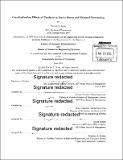Cannibalization effects of products in Zara's stores and demand forecasting
Author(s)
Kong, Evelyne L
DownloadFull printable version (8.454Mb)
Other Contributors
Leaders for Global Operations Program.
Advisor
Georgia Perakis and Bruce Cameron.
Terms of use
Metadata
Show full item recordAbstract
Because of short product life cycles, large product offerings and fickle consumer tastes, product demand in the apparel retail industry is volatile and difficult to predict. It is also thought to be impacted significantly by the presence of other products in the store, which may cannibalize or complement sales. This thesis explores the interactions among products in Zara's stores, and uses this information to improve the existing demand forecast. It focuses on attribute-based and price-based cannibalization effects for the trousers product category. A necessary preliminary step to study cannibalization is to obtain an accurate classification of all products according to distinct features. We present such a classification for the trousers product category according to three main characteristics-fit, color and color lightness. The text mining and picture color detection techniques used here are of independent interest and can be used for the classification of other product categories. We then use Zara's RFID system and sales databases to estimate cannibalization effects among products in stores. To this purpose, we introduce similarity factors and define a linear regression model with fixed and time effects. We obtain statistically significant cannibalization effects. However, these effects tend to account for only a small portion of demand variations. Finally, we propose various improvements to the demand forecast method, incorporating display, availability and cannibalization effects. The resulting demand forecast represents a significant improvement over the base forecasting model. It reduces the forecasting error by over 10% for the sample stores in Madrid, Barcelona and London and by over 7% with only partial display information. Thus the implementation of the present work will reduce overstock and lost sales. It also constitutes the first step towards product assortment optimization at Zara.
Description
Thesis: S.M., Massachusetts Institute of Technology, Engineering Systems Division, 2015. In conjunction with the Leaders for Global Operations Program at MIT. Thesis: M.B.A., Massachusetts Institute of Technology, Sloan School of Management, 2015. In conjunction with the Leaders for Global Operations Program at MIT. Cataloged from PDF version of thesis. Includes bibliographical references (pages 60-61).
Date issued
2015Department
Leaders for Global Operations Program at MIT; Massachusetts Institute of Technology. Engineering Systems Division; Sloan School of ManagementPublisher
Massachusetts Institute of Technology
Keywords
Engineering Systems Division., Sloan School of Management., Leaders for Global Operations Program.